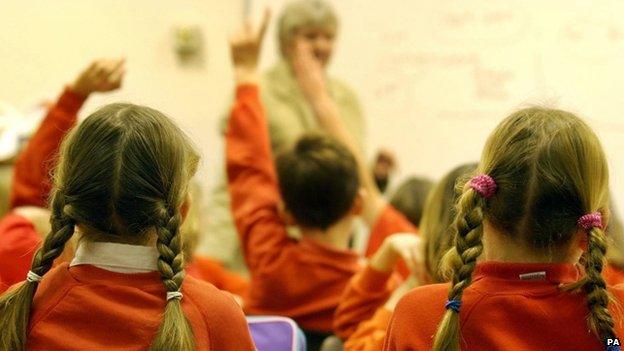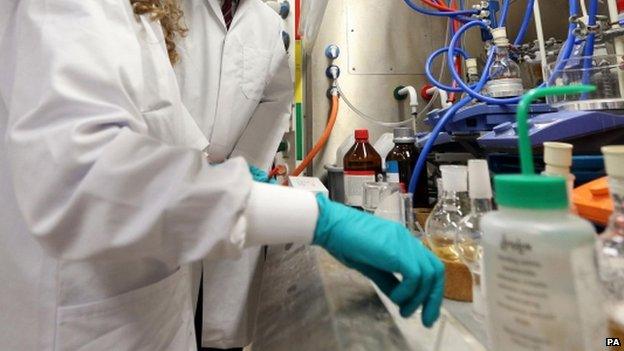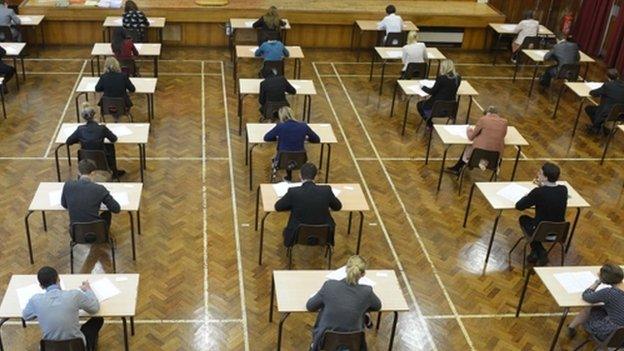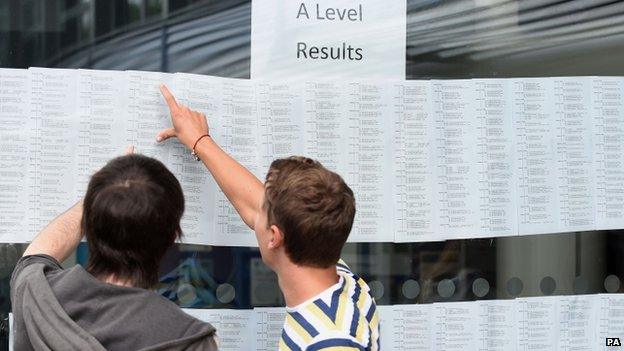Daily question: How does education fit into the referendum debate?
- Published
As the people of Scotland weigh up how to vote in the independence referendum, they are asking questions on a range of topics from the economy to welfare.
In this series, we are looking at those major questions and by using statistics, analysis and expert views shining a light on some of the possible answers.
Here, we focus on education. Although it is already under the control of the Scottish government at Holyrood both sides of the campaign have seized upon it as an issue.
Do you have a referendum question? Let us know by....
Emailing newsonlinescotland@bbc.co.uk.
We can also be found on Twitter @bbcscotlandnews, external
And on Facebook, external.
BBC news website users, Dr S Anderson, David Smith, David Wilson, Mario Goodwin, Angus Millar and Lorraine Monaghan have all asked questions about education and the Scottish independence debate.

Holyrood has control over education in Scotland, doesn't it?

Yes. Even before devolution in 1999, the Scottish education system was quite distinct from England's. Since devolution though, the gulf between policies and practice south of the border has widened. For instance, the new fourth year qualifications in Scotland are quite distinct from those in England.
Responsibility for nurseries, schools and colleges lies with Holyrood. Universities guard their independence from the state fiercely but receive some of their funding from the Scottish government through the Scottish Funding Council. As such, the Scottish government can pay for the tuition of Scottish students and work with universities to agree priorities.

So, would independence have any effect on nurseries, schools and colleges?
Childcare in Scotland
27%
Family income spent on childcare in Scotland
5%
Family income spent on childcare in Sweden
-
50% Families relying on grandparents to help with childcare
-
79% Councils saying they do not have sufficient childcare
-
£1,032 Annual shortfall, per child, in council-funded places at private nurseries
Supporters of independence argue that an independent Scottish government could have more money to spend on improving the system.
The White Paper, external on independence highlighted how the SNP hoped to improve childcare if it formed an independent government. However, opponents of independence questioned these plans and stressed constitutional change was not necessary to improve childcare.

So, why is education still an issue?

Mostly because of issues surrounding universities.
The principle issue concerns the position of students from England, Wales and Northern Ireland at Scottish universities. Students from England, Wales and Northern Ireland are charged tuition fees of up to £9,000 a year but Scottish students have their tuition paid by the Scottish government. To comply with European Union rules, students from other EU countries - including the Republic of Ireland - also receive free tuition. This is because it is possible to discriminate between students from different parts of one member state but not between those from other states.
There is fierce debate over whether English, Welsh and Northern Irish students would have to be given free tuition too if Scotland became independent - potentially at a huge cost.
The SNP believes they would not - the main opponents of independence believe they would. Ultimately, the matter would probably have to be settled in the European Court in what would be likely to be a lengthy process.

What about university research funding?

The Scottish government, which currently provides a third of research funds - argues that the current single, UK-wide structure for funding could continue.
Academics for Yes, external argues that Scotland's current research base would be protected under independence, pointing to current joint arrangements between the UK and Ireland.
But Academics Together, external, which is part of the pro-Union Better Together campaign, argues that independence would put research funding "at serious risk".

Would changes to education in England be replicated in Scotland?

No. Changes to school education in England have no direct bearing on Scottish education whatsover. Any decision to copy a Westminster policy or practice is already made in Scotland.

Would students at some independent schools still be able to study for A Levels?

Yes. These matters are negotiated by the schools and exam boards directly so any constitutional change would not have a direct impact.